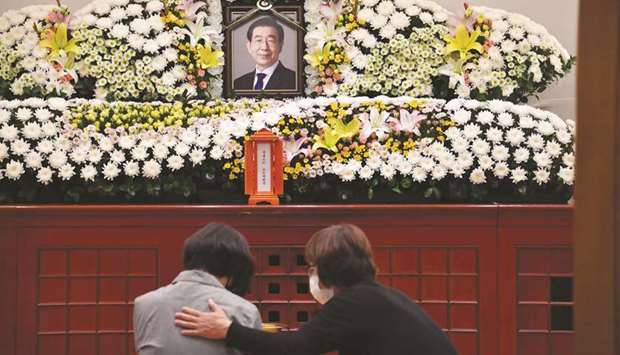The magnitude of South Korea’s sexism problem has been illustrated by the case of a top politician and women’s rights advocate who was accused of sexual harassment then took his own life, activists say.
Seoul mayor Park Won-soon, a former human rights lawyer, was instrumental in advocating against gender discrimination and in the 1990s won what is widely considered the first sexual harassment case in the conservative society.
But following his suicide, feminist campaigners said he had avoided shame and punishment for allegedly harassing his female secretary, who filed a police complaint against him the day before his death. The circumstances of Park’s case — despite his liberal background and after a high-profile #MeToo campaign in the country — highlight the scale of gender inequality in South Korean politics, they said yesterday.
Park was the latest in a series of senior figures in the ruling centre-left Democratic party to face accusations of sexual misconduct. Ahn Hee-jung, a former provincial governor who was runner-up in the 2017 race for the party’s presidential nomination, was convicted of “sexual abuse of authority” last year. And three months ago Oh Keo-don, the Democratic mayor of South Korea’s second biggest city Busan, resigned after admitting he had “unnecessary physical contact” with a female staffer.
“Almost all South Korean men, whether they are politically conservative or liberal, are very traditional and patriarchal when it comes to gender issues,” Lee Soo-yeon, a researcher at the Korean Women’s Development Institute in Seoul, told AFP.
“Politicians — who constantly seek power and acknowledgement — are no exception.”
Male Korean politicians also “generally don’t understand what’s private is also political”, she said. “They would endorse feminism if it helps their political career, but would not think how they treat women in real life — such as at home or at work — also matters.” Activists have previously accused President Moon Jae-in — who once called himself a feminist — of failing women. “This is both the failure of the individual and the political party,” said Harvard researcher Keung Yoon-bae.
“The chauvinism and misogyny — as well as the blindness to these issues — within the Korean Left has a long history, going back to student activism,” she added. “It can’t go unaddressed.”
Park was one of the most prominent male advocates for women’s rights in South Korea and a pioneering figure in the field.

Mourners visiting a memorial for the late Seoul mayor Park Won-soon at the Seoul National University hospital in Seoul.
